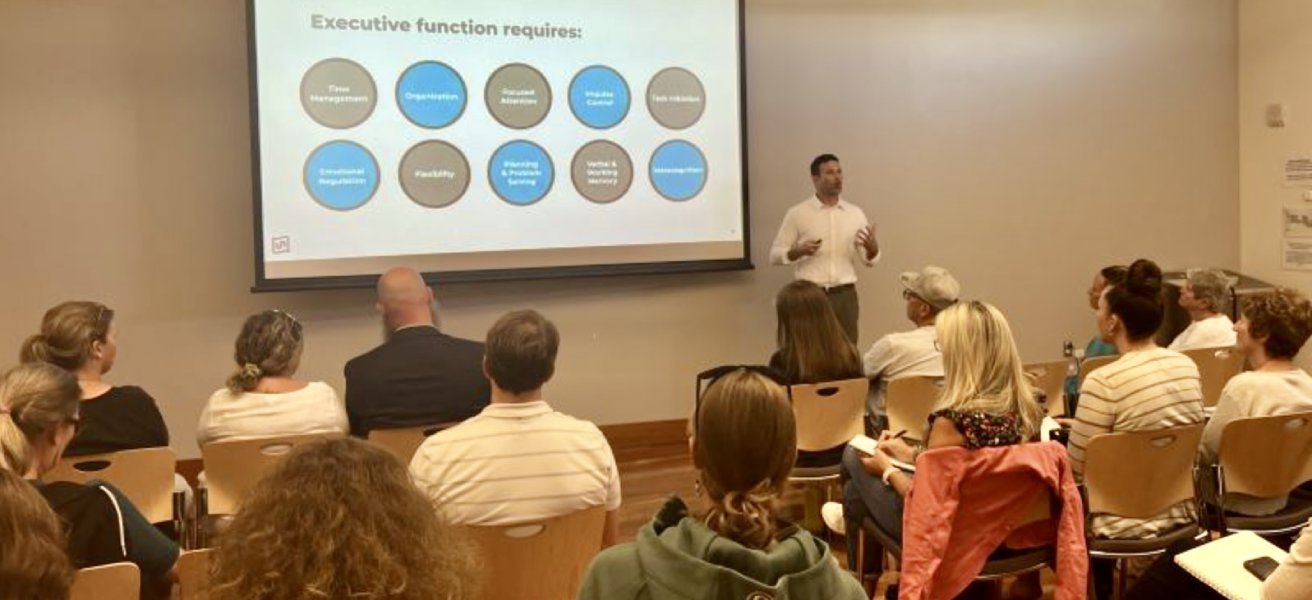Understanding how executive function skills develop is key to supporting children and adolescents as they grow. These important skills, which include working memory, maintaining attention, and controlling impulses, are the brain’s management system. They help us plan, organize, stay focused, and manage our emotions. This guide breaks down how these skills develop by age and offers tips for parents and educators.
What are Executive Function Skills?
Executive function skills are like the CEO of your brain. They help you manage your thoughts, actions, and emotions to get things done. Think of them as the mental processes that allow you to:
- Plan and organize: Figure out the steps needed to complete a task, like a school project.
- Stay focused: Pay attention in class, even when there are distractions.
- Remember information: Recall instructions or information you just learned.
- Remember information: Recall instructions or information you just learned.
- Manage your time: Estimate how long a task will take and finish it on time.
- Control your impulses: Think before you act, resist distractions, and manage your emotions.
- Adapt to changes: Adjust your plans when something unexpected happens.
How Executive Function Skills Develop by Age
Executive functions develop gradually, starting in early childhood and continuing into early adulthood. The development of executive function skills can be broken into two categories: foundational and advanced.
The foundational skills, such as working memory and impulse control, develop earlier and build the base for the later, more advanced skills. Children learn to manage their emotions and plan during the elementary years. As children develop, they continue to build their abilities in these areas. Let’s explore how these skills typically emerge by age group.
Elementary School: Building the Foundation
School age children in elementary school are building the foundational executive function skills. This age group is learning:
- Response Inhibition: The ability to stop and think before acting. For example, raising their hand in class instead of blurting out an answer.
- Working Memory: Holding information in mind while doing something else, like remembering a set of instructions.
- Emotional Control: Managing their feelings, even when frustrated or upset. For instance, staying calm when they lose a game.
- Flexibility: Adapting to changes in plans or routines.
Supporting Elementary Students:
- Create routines: Predictable schedules help children practice organization and time management.
- Use visual aids: Charts and checklists can help them remember steps in a task.
- Play games: Games like Simon Says and Red Light, Green Light help develop inhibitory control and working memory.
- Model emotional regulation: Help them identify their feelings and learn healthy coping mechanisms.
Middle School: A Time of Transition
Middle school is a pivotal time when children develop skills needed for longer periods of time. Students need to manage more complex assignments and navigate changing social dynamics. This age group is developing:
- Planning: Breaking down large tasks into smaller steps.
- Organization: Keeping their school materials and belongings in order.
- Time Management: Estimating how long tasks will take and using their time efficiently.
- Goal-Directed Persistence: Staying focused on a goal, even when it’s challenging.
Supporting Middle School Students:
- Use planners or calendars: Help them track assignments, deadlines, and activities.
- Teach prioritization: Help them determine which tasks are most important and need to be done first.
- Encourage self-reflection: Ask them to think about what study strategies are working well and what they could improve.
- Model good habits: Show them how you plan, organize, and manage your time.
High School: Preparing for the Future
High school students face increasing academic and social demands. They need strong executive function skills, including attentional control, to succeed. This age group is refining:
- Thinking about their thinking and learning processes.
- All foundational and advanced executive function skills. High school is a great time to continue practicing and improving in all areas.
Supporting High School Students:
- Encourage independence: Allow them to take ownership of their schoolwork and responsibilities.
- Provide guidance, not control: Offer support and suggestions, but let them make their own decisions.
- Help them develop problem-solving skills: Encourage them to find solutions to challenges they encounter.
- Promote balance: Help them find a healthy balance between school, extracurricular activities, social life, and rest.
The Importance of Executive Function Skills Beyond School
Strong executive function skills are not just important for academic success. They are important life skills that contribute to success in college, the workplace, and personal relationships. Individuals with well-developed executive function skills are better equipped to:
- Set and achieve goals.
- Manage their time effectively.
- Adapt to new situations.
- Solve problems creatively.
- Build strong relationships.
- Handle stress and challenges.
Conclusion
Executive function skills are crucial for success in all areas of life. By understanding how these skills develop by age and providing appropriate support, parents and educators can help children and adolescents build a strong foundation for a bright future.
Remember that every child develops at their own pace. Be patient, provide encouragement, and celebrate their progress along the way. With the right support, all children can develop the executive function skills they need to thrive.
For More:
Assessing Executive Function in Adolescence
Executive Functioning: Relationship with High School Student Role Performance





